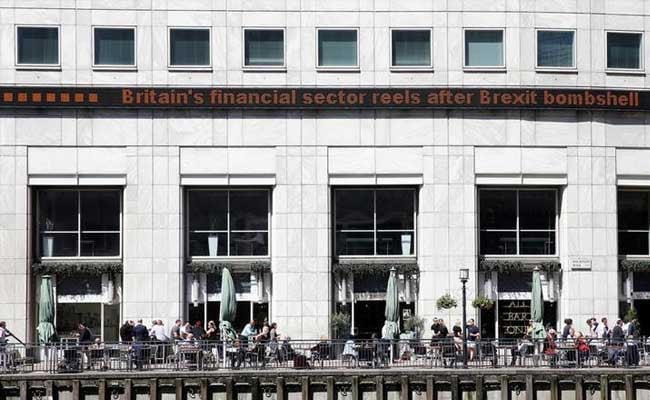
People eat and drink in the sunshine in London's Canary Wharf financial centre on June 24, 2016 after Britain voted to leave the European Union in the EU Brexit referendum. (Reuters photo)
Warsaw/Prague:
Poland joined German Chancellor Angela Merkel on Monday in saying Britain should be allowed time to prepare for its negotiations on leaving the European Union.
Britons stunned global financial markets and world leaders by voting in last Thursday's referendum to leave the EU.
Some European politicians have called for a quick divorce. But British Prime Minister David Cameron, who plans to quit in the autumn, has said it will be his successor who starts the formal exit process by invoking Article 50 of the Lisbon Treaty.
"We need a longer period of reflection (on Brexit)," Polish Foreign Minister Witold Waszczykowski told state broadcaster TVP Info before leaving for Prague to meet his counterparts from the Czech Republic, Hungary, Slovakia, Germany and France.
"This cannot be a hasty action consisting of forcing Britain out as fast as possible," he said.
Earlier Merkel, Europe's most powerful leader, said she did not want to pressure London to slow or accelerate its exit. A German government spokesman said Merkel was pursuing a "calm and reasoned" approach to relations with Britain.
After the Prague meeting, Slovakia -- which takes over the rotating EU presidency for six months in July -- and the Czech Republic said there was some room to wait but Britain should start the process soon nevertheless.
"It is not necessary to rush ... We don't have a legal vacuum but the legal situation does not correspond to the political situation. And that is not right," said Slovak Foreign Minister Miroslav Lajcak.
EU Reform
Poland's Waszczykowski also called for reforms to limit the EU's impact on member states' national political agendas, saying Europeans did not want "to hand the European Union into the hands of technocrats".
Poland's eurosceptic government is currently at loggerheads with Brussels over a range of issues including its reform of the constitutional court.
The east Europeans - net beneficiaries of the EU budget - have been quick to reaffirm their allegiance to the bloc after the Brexit vote, while also arguing that
European integration should not come at the detriment of national interests.
"We agreed that the debate on the future of the EU must take place on the platform of 27 states and that the key ones who should lead it are leaders of the individual member states, the member states themselves, the European Council," Czech Foreign Minister Lubomir Zaoralek said.
"The wrong response would be a quick, hasty integration, and the wrong response would be to pretend nothing has happened."
Britons stunned global financial markets and world leaders by voting in last Thursday's referendum to leave the EU.
Some European politicians have called for a quick divorce. But British Prime Minister David Cameron, who plans to quit in the autumn, has said it will be his successor who starts the formal exit process by invoking Article 50 of the Lisbon Treaty.
"We need a longer period of reflection (on Brexit)," Polish Foreign Minister Witold Waszczykowski told state broadcaster TVP Info before leaving for Prague to meet his counterparts from the Czech Republic, Hungary, Slovakia, Germany and France.
"This cannot be a hasty action consisting of forcing Britain out as fast as possible," he said.
Earlier Merkel, Europe's most powerful leader, said she did not want to pressure London to slow or accelerate its exit. A German government spokesman said Merkel was pursuing a "calm and reasoned" approach to relations with Britain.
After the Prague meeting, Slovakia -- which takes over the rotating EU presidency for six months in July -- and the Czech Republic said there was some room to wait but Britain should start the process soon nevertheless.
"It is not necessary to rush ... We don't have a legal vacuum but the legal situation does not correspond to the political situation. And that is not right," said Slovak Foreign Minister Miroslav Lajcak.
EU Reform
Poland's Waszczykowski also called for reforms to limit the EU's impact on member states' national political agendas, saying Europeans did not want "to hand the European Union into the hands of technocrats".
Poland's eurosceptic government is currently at loggerheads with Brussels over a range of issues including its reform of the constitutional court.
The east Europeans - net beneficiaries of the EU budget - have been quick to reaffirm their allegiance to the bloc after the Brexit vote, while also arguing that
European integration should not come at the detriment of national interests.
"We agreed that the debate on the future of the EU must take place on the platform of 27 states and that the key ones who should lead it are leaders of the individual member states, the member states themselves, the European Council," Czech Foreign Minister Lubomir Zaoralek said.
"The wrong response would be a quick, hasty integration, and the wrong response would be to pretend nothing has happened."
© Thomson Reuters 2016
Track Latest News Live on NDTV.com and get news updates from India and around the world

